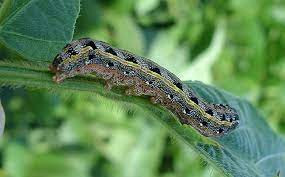
AN armyworm outbreak has rattled farmers who are already jittery over an El Niño-induced below normal rainfall season which threatens to blight their crops.Government yesterday warned farmers to be wary of the deadly African armyworm which will most likely devastate both crop and livestock farmers and has since affected four provinces.
The pest usually emerges during rain seasons following prolonged drought periods and attacks virtually all cereal crops such as maize, millet, sorghum, rice and wheat.It also ruins sugarcane seedlings and pasture grasses.
The World Food Programme this week said Zimbabwe and many southern African countries should expect dry weather conditions in the coming days as the El Niño weather conditions persist.
Lands, Agriculture, Fisheries, Water and Rural Resettlement migratory pests control department acting director Shingirayi Nyamutukwa yesterday said the affected provinces were Mashonaland Central, Mashonaland East, Mashonaland West and the Midlands.
“We have a total of four provinces so far that have given reports of outbreaks, starting from Mashonaland East, where we received an outbreak report around Christmas time last year, but today, three more provinces have given reports, this is Mashonaland Central, Midlands, as well as Mashonaland West,” said Nyamutukwa.
“As of today, a total of 164,5 hectares have been affected and the total of 54,83 hectares of sorghum, as well as less than one hectare of finger millet has been attacked by African armyworm.
“However, in terms of pastures, we have at least 32 hectares that have also been damaged by the African armyworm,” he said.Nyamutukwa said the government was also receiving more reports, adding that at least 234 farmers had been assisted with chemicals to control the African armyworm.
“As government, we have provided chemicals and we are currently assisting farmers in Mashonaland West and Midlands through provision of chemicals for African armyworm control.
- Addressing unfair trade key to transforming African food systems
- Private transporters, police clash
- Residents finger ZETDC employees in cables theft
- New perspectives: Building capacity of agricultural players in Zim
Keep Reading
“So, what we are currently experiencing is that the rains have subsided and we expect that there is going to be more of these outbreaks.“So, we are, therefore, encouraging our farmers to frequently scout their fields. If at all, they should scout on a daily basis so that they can be able to identify any pests that are attacking their crops,” he said.
Nyamutukwa said the caterpillars moved in large numbers and could be identified by the velvet black colour.“Once farmers see this, they should report immediately to the nearest Agritex officer and then we should be able to move in swiftly in terms of provision of chemicals so that they can be able to control the caterpillars well in time because this season we are not expecting it to be a very long season,” he said.
Zimbabwe Commercial Farmers Union president Shadreck Makombe also confirmed the African armyworm outbreak.“Yes, we are aware of the outbreak. That's why you see the experts and responsible authorities reporting about it because they would have got the information from the farmers,” he said.
Urging farmers to scout their fields he said: “Farmers should preserve their crops and at the same time, they should alert the responsible authorities so that they can come and assist.”
Makombe added that controlling the outbreak could be hampered by several challenges including logistics.Agricultural expert Edward Dune said while the outbreaks had become perennial, the challenges could be overcome.
“We have adequate armour as a nation and our foot soldiers are armed to the teeth countrywide to deal with the outbreak,” he said.






